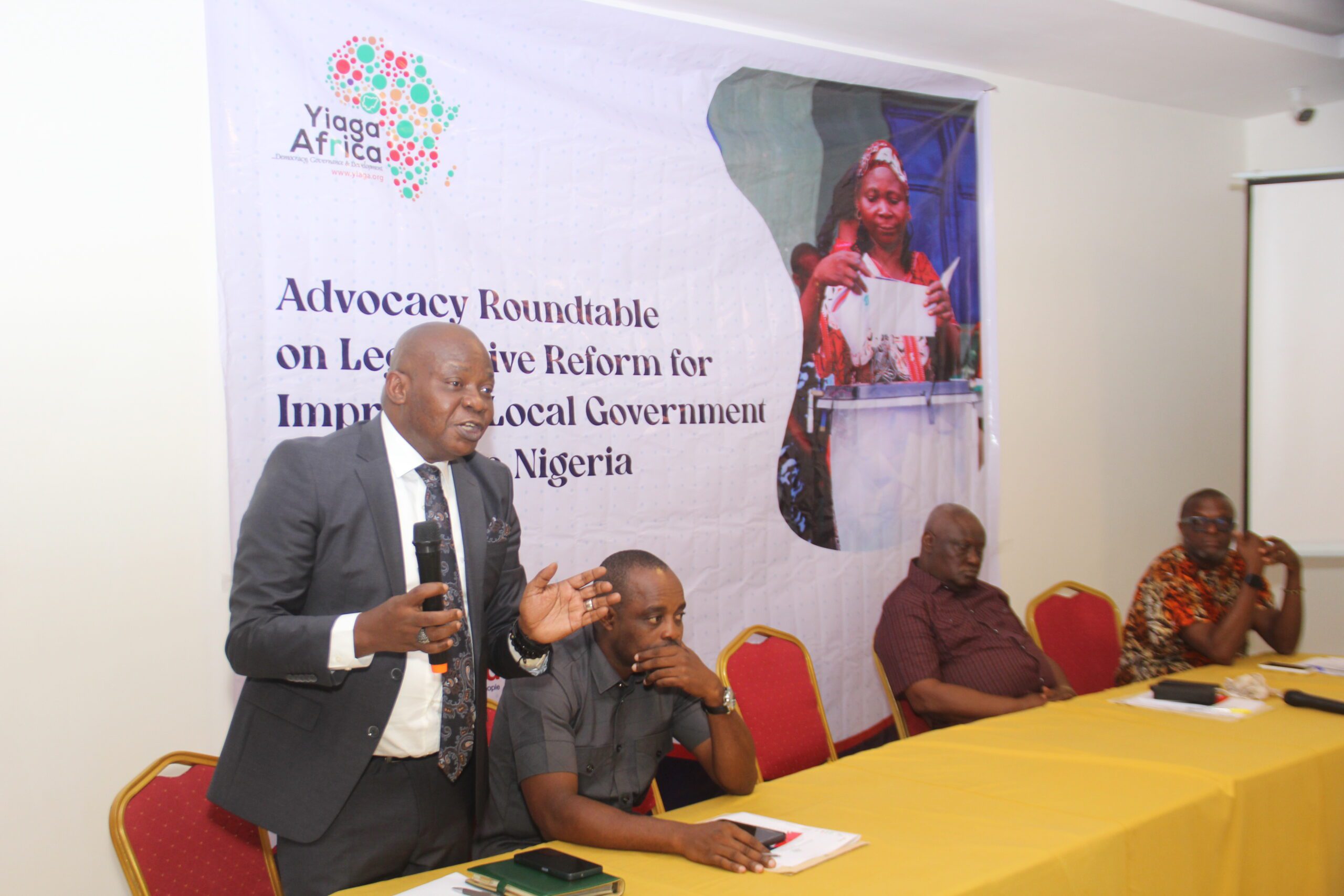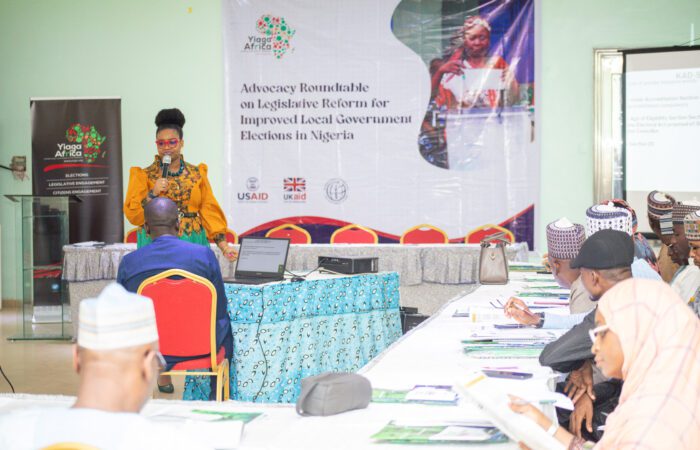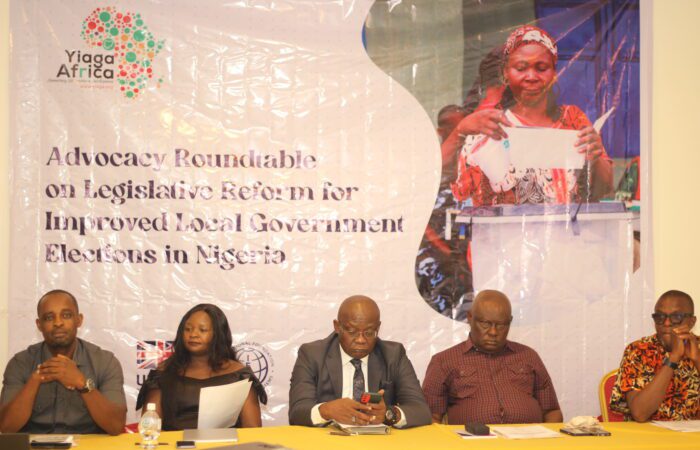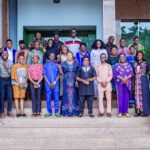Communiqué Issued after the Advocacy Roundtable on Legislative Reform for Improved Local Government Elections in Akwa Ibom State by the Akwa Ibom State Civil Society Forum
Held on Wednesday, April 24, 2024, in Uyo, Akwa Ibom State.
COMMUNIQUÉ
Preamble
Yiaga Africa, in partnership with the International Foundation for Electoral Systems (IFES), supported by the United States Agency for International Development (USAID) and the Foreign and Commonwealth Development Office (FCDO), held a one-day Advocacy Roundtable on Legislative Reform for Improved Local Government Elections with stakeholders in Akwa Ibom State on Wednesday April 24, 2024.
The Advocacy Roundtable is part of a Civil Society-Led Advocacy to enhance the quality of local government elections and build model State Independent Electoral Commissions (SIECs) in Nigeria. The Roundtable was organized as part of efforts to support the relevant state government institutions, the Akwa Ibom State Independent Electoral Commission (AKSIEC), political parties, civil society organizations (CSOs), and the media on strengthening the election legal framework in Akwa Ibom state to promote electoral integrity at the local government level.
As a result, a cohort of civil society actors in the state, media partners and the Akwa Ibom State Independent Electoral Commission in this one-day event deliberated on emerging issues relating to the conduct of local government elections. With a keynote address by Mr. Ezenwa Nwagwu, Chair, Partners for Electoral Reforms and a presentation on “Strengthening the Election Legal Framework to Promote Electoral Integrity at the Local Government level by Ms. Cynthia Mbamalu, Director of Programs, Yiaga Africa a robust panel discussion ensued with Mr. Aniedi Ikoiwak, Chairman, AKISIEC; Akwa Ibom State Civil Society Forum, represented by Mr. Ndifreke Patrick, Executive Director of Arc Initiative Africa, Mrs. Safiya Bichi of Yiaga Africa and Bassey Anthony; Chairman, NUJ, Correspondent Chapel Akwa Ibom. There were also remarks from Mr. Abdulrahman Zubairu, IFES; Usoro Ukpanah, Commissioner AKSIEC.
Observations
Following the keynote address, Presentations, and Discussions held, the following observations were made:
- Akwa Ibom State Local Government is currently run by a transition committee, having held its last local government elections in October 2020.
- Akwa Ibom State is in the process of signing into law a new State Independent Electoral Commission Law, which is an amendment of the State Independent Electoral Commission Law, 2007.
- The State Independent Electoral Commission Amendment Bill which was an Executive Bill has been passed in the Akwa Ibom State Assembly and requires the assent of the Governor to become Law.
- It is noted that the review of the Law did not provide sufficient time for CSOs, Media and the public to adequately contribute to the Bill as public hearing on the proposed Bill was conducted in a hurry without sufficient notice and awareness to the public.
- The system of local government authority is established in the 1999 Constitution of Nigeria (as amended), as such, ensuring democratic and periodic elections in the local government should remain the priority of every Nigerian and every State Government.
- Section 150 of the Electoral Act 2022 requires that local government elections be conducted in line with the respective sections of the Electoral Act 2022 regulating the conduct of the Federal Capital Territory (FCT) Area Council elections.
- A robust legal framework for LGA elections can guarantee electoral integrity, enable political inclusion and citizens’ participation, and regulate political party conduct at the local level.
- Constitutional amendment to guarantee Local Government autonomy will be the most effective means of ensuring effective and democratic local government administration.
- The lack of a legal framework that sufficiently speaks to the autonomy of the local government in terms of funding and budgetary provisions is a fundamental gap in the effective administration of local government elections and its democratic development.
- The lack of local government autonomy has further entrenched nature of docility, non-participation, or passive participation of citizens and opposition political parties in local government elections
- Pending the Constitutional Amendment for full autonomy, the State governments are currently failing in their constitutional mandate of ensuring the existence of democratically elected and functional local government authority.
Recommendations
Given the above observations, the Akwa Ibom CSOs Forum recommend as follows:
- The proposed amendments in the Akwa Ibom State Electoral Commission Law (2007) currently being reviewed should be consistent with the provisions of the 1999 Constitution of Nigeria (as amended) and the Electoral Act 2022 (as amended).
- In accordance with the proposed reform in the revised State Electoral Commission Law, the State Independent Electoral Commissions (SIECs) should be given the required independence, particularly in their financing, to enable the AKSIEC adequately prepare for local government elections and begin to inspire trust of the people in the local government election process.
- The Executive Governor of Akwa Ibom is commended for leading efforts on the review of the State Electoral Law and further encouraged to give timely assent to the Bill passed by the State House of Assembly after ensuring that the Bill is consistent with the respective provision of the 2022 Electoral Act.
- The Akwa Ibom State Independent Electoral Commission should strengthen its collaboration with the Civil Society Organizations, the Media and Political Parties in the State by holding periodic briefing meetings and working together to build trust in the local government electoral process.
- The Akwa Ibom State Independent Electoral Commission should invest in continuous civic and voter education and periodic communication with the public and relevant stakeholders to inspire confidence in local government election.
- Civil Society Organizations and the Media should provide sustained and adequate voter and civic education and sensitization to encourage increased citizens’ participation in the local government election process.
- Civil Society Organizations and the Media should ensure objective and data-driven observation and reportage/statements of the LGA elections
- Election stakeholders which includes political parties, CSO’s, international partners, the academia and the media should give local government elections the much-needed attention such as is done during gubernatorial and presidential elections.
Conclusion
Local Government elections remain an important part of our democratic process. We have an opportunity to review the legal framework for elections at the local government level to guarantee periodic, transparent, free and fair local government elections. We believe that Akwa Ibom has an opportunity to be a pacesetter in enhancing the quality of local government elections. We call on all election stakeholders in Akwa Ibom state to work towards achieving the signing into Law of the reviewed State Independent Electoral Commission Bill and its operationalization for credible local elections in Akwa Ibom State.
God bless Akwa Ibom State.
God bless Nigeria.
Signed:
Akwa Ibom State Civil Society Organisations (CSOs) Forum
The Nigerian Union of Journalists, Akwa Ibom State
Yiaga Africa






